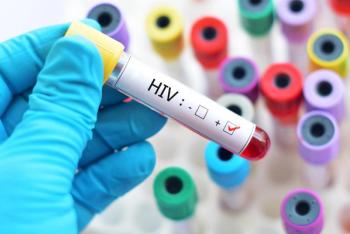
Nakia Eldridge, PharmD, MBA, director of health care quality, safety, and information at US Pharmacopeia (USP), discusses points of note regarding USP’s work in setting and supporting public quality standards.

Nakia Eldridge, PharmD, MBA, director of health care quality, safety, and information at US Pharmacopeia (USP), discusses points of note regarding USP’s work in setting and supporting public quality standards.

There are other courses available on HIV, but PQA's surveys the 13 medication related quality measures out there for HIV.

The term "value" is used interchangeably across our healthcare system.

The panel offers effective practices to establish value-based and pathway-driven care for patients with MPNs.

Dr Haumschild leads a discussion about maximizing the impact of care through electronic medical record (EMR) utilization.

One of PQA's quantitative research projects that they are working on now is looking at how medication adherence is related to outcomes.

Aklilu Tedla, vice president of strategy and business development at Cardinal Health, discusses the cell and gene therapies in the pipeline for approval by the FDA.

PQA's program is focused on quality measurement and improving the safe and appropriate use of medications.

Aklilu Tedla, vice president of strategy and business development at Cardinal Health, discusses the future of pharmacies as more cell and gene therapy products become available to patients.

PQA is working on developing measures specifically for evaluating pharmacy performance measurement.

Neil Lund, senior advisor, Avelere Health and Ryan Urgo, managing director, Health Policy, Avelere Health, discuss the impact of President Biden’s health care agenda on the pharmacy field.

Doug Long, vice president, Industry Relations, IQVIA, discusses notable trends reshaping specialty pharmaceutical channels and the impact of these developments on the role of the pharmacist in the health care team.

The SDOH resource guide focuses on services specific to the pharmacy and pharmacists.

The PQA team is diverse, and they have expertise in quantitative research as well as quality.

These measures are specified for application to pharmacies, as opposed to health plan measures.

Joel Wayment, vice president of operations for 3PL Services at Cardinal Health, discusses how the pharmaceutical supply chain currently manages the transport of CAR T products to sites of administration.

Ray Tancredi, divisional vice president of Specialty Pharmacy, Development & Brand Rx/Vaccine Purchasing at Walgreens, discusses blockbuster drugs in the oncology space that have been approved this year or may be hitting the market soon.

Tracy Russell, senior director, State Government Affairs at CoverMyMeds, discusses state and federal legislation that may be impacting the future of specialty pharmacies and the patient care they deliver.

Cara McNulty, president of Behavioral Health and Mental Well-Being at CVS Health, discusses a recently published survey from CVS Health Study on rising concerns of mental health in Americans.

In an interview with Pharmacy Times, Amy Pfeifer, PharmD, BCPS, CSP, of AllianceRx Walgreens Prime, discussed the important role that pharmacists can play in the treatment of prostate cancer.

Pharmacy specialists illustrate the benefits of using a comprehensive team for care delivery to patients with MPNs.

Highlighted are proposed solutions for current barriers to care for MPNs.

Sneha Sharma, director, specialty clinical solutions at Magellan Health, discusses some trends in the rare disease space that she recommends pharmacists keep an eye on this year.

Amy Ware, director, specialty clinical solutions at Magellan Health, discusses what it means to be future focused as a pharmacist in the specialty pharmacy field.

Jayne Hornung, chief clinical officer – pharmacy, Managed Markets Insight & Technology, discusses her presentation on potential causes of the slow uptake in digital therapeutics among payers.

Tracy Russell, senior director, State Government Affairs at CoverMyMeds, discusses her presentation at Asembia Summit 2022 on legislation aligned with the movement to expand the pharmacist’s role on the care team.

Ray Tancredi, divisional vice president of Specialty Pharmacy, Development & Brand Rx/Vaccine Purchasing at Walgreens, addresses his presentation on the specialty pharmaceutical pipeline, and specifically what approvals pharmacists should look for on the horizon.

Sonia T. Oskouei, PharmD, vice president of biosimilars at Cardinal Health, discussed how pharmacists can impact biosimilar adoption.

Jayson Slotnik, JD, MPH, partner at Health Policy Strategies, discusses his hopes for the future of value-based contracting and the ideal model for pharmacy’s involvement.

Ray Tancredi, divisional vice president of Specialty Pharmacy, Development & Brand Rx/Vaccine Purchasing at Walgreens, discusses some of the more significant drugs for specialty pharmacy in the FDA pipeline this year.